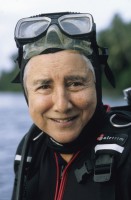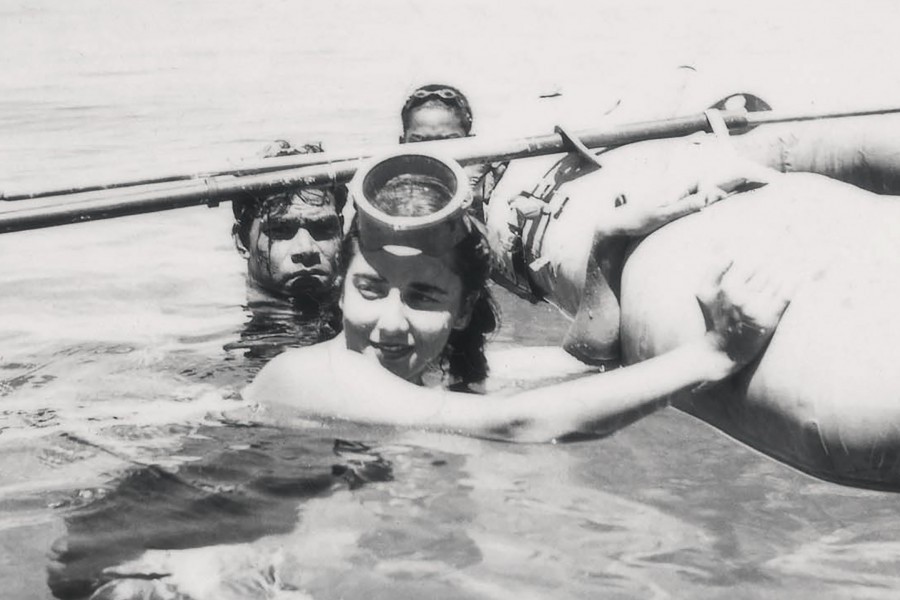American Elasmobranch Society establishes Eugenie Clark Award
Dr. Eugenie Clark — the world-famous "Shark Lady" who founded Mote Marine Laboratory — was a visionary researcher and a trailblazer for women in science, especially the study of sharks and other fishes.
To honor the memory of Clark, who passed away at age 92 on Feb. 25., and to continue inspiring scientists studying elasmobranchs — sharks, skates and rays — the American Elasmobranch Society (AES) in conjunction with Save Of Seas Foundation and Mote, have established the Eugenie Clark Award.
This annual $2,500 award recognizes female, early-career scientists who demonstrate uncommon perseverance, dedication and innovation in biological research and public outreach on elasmobranch fishes, just as Clark did.
Clark established her widely successful career during a time when men dominated scientific fields and women were discouraged from becoming research scientists. Always the inquisitive explorer, Clark made her mark studying the natural history, reproductive biology and behavior of sharks and other fishes observed in the wild and in the lab. As a university professor, Genie educated thousands of college students in ichthyology and shark biology. In addition to her hundreds of technical publications in journals, Genie wrote many books and articles for popular audiences around the world. She was dedicated to helping the public learn about oceans and marine species.
In 1955 she founded Mote Marine Laboratory, establishing a strong foundation in research on sharks and other fishes. Mote has expanded to include 25 diverse research programs and scientists working around the world.
“AES is very proud to offer this distinguished award to honor Genie’s legacy and to recognize the outstanding achievements of some of the brightest scientists in the field today. I believe this award will become a career milestone and accelerant for those fortunate enough to receive it,” said Dr. Chris Lowe, AES President.
Funding for the award, dependent upon candidate eligibility and funding availability, is made possible by two annual donations to AES of $1,250 by the Save Our Seas Foundation and by Mote Marine Laboratory’s Center for Shark Research.
"Because of the special place that Genie holds in our history and our hearts at Mote, and because we value the ideals embodied in the Eugenie Clark Award, I am proud to match the Save Our Seas Foundation donation of $1,250 each year with an equivalent donation of $1,250 from Mote's Center for Shark Research for this award,” said Dr. Robert Hueter, Director of the Center for Shark Research at Mote.
Eligible candidates range from female Master’s and Ph.D. students to female scientists who have earned their graduate degree within the last five years. Candidates must be AES members in good standing (society dues paid by Jan. 1 of the calendar year of the award); must practice effective and broad-based public outreach in elasmobranch biology; be in at least their second year of consecutive, in-good-standing AES membership; and have all necessary application materials submitted by the relevant deadline.
Eligible fields of research are broad, but must include some aspect of organismal biology of elasmobranchs studied in the field.
AES Regular, Senior and Lifetime members, AES officers, non-AES professional scientists, and candidates themselves may nominate a candidate for the award. The AES Grant Fund Committee shall screen nominees and selection of the annual awardee will be done in consultation with the AES Executive Committee, a representative of the Save Our Seas Foundation and a representative of Mote’s Center for Shark Research. Announcement of the winner of the “Genie” award will be made at the AES annual meeting in or near July of each year.
“Genie Clark was such an extraordinary person and scientist,” said Dr. Michael P. Crosby, President and CEO of Mote. “Her fascination with fishes and her impeccable dedication to research was unparalleled. Her true passion for science and freedom to pursue that passion at Mote inspired many and set a trail for women in science who strive to make a positive impact in the field. She graciously opened her heart and mind to make ocean knowledge more accessible to many. She was approachable and incredibly knowledgeable. Her immense leadership and legacy has created a tradition of world-class marine research and education that will continue for generations.”

